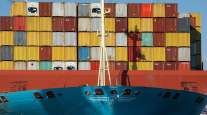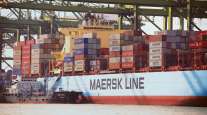US, EU, China Vie for Influence in Eastern Europe

BUCHAREST, Romania — President Donald Trump on Sept. 17 reaffirmed Washington’s support for a business summit that aims to boost connectivity in Eastern Europe and improve ties among the region and the United States and European Union.
But the West is not the only major player in the region. Shortly before European Commission President Jean-Claude Juncker and U.S. Energy Secretary Rick Perry arrived in Bucharest for the two-day Three Seas Initiative Business Forum, Romanian Prime Minister Viorica Dancila met a top Chinese official, saying Romania wanted to export more to China and attract more investment from there.
RELATED: Trump Plans to Slap 10% Tariff on $200 Billion of Chinese Goods, Sources Say
The timing of the visit by Shen Yueyue, a senior official in the National People’s Congress, may raise eyebrows in the light of one of the biggest summits Romania has hosted in recent years. Yet it shows how Romania and its neighbors are using regional leverage to attract the best deal for the less developed part of the bloc. It’s something the EU is watching closely.
Regional analyst Radu Magdin said Central and East European countries are “bold enough to know what they want and self-aware enough to use great power competition to their advantage.” He said Hungary was adept at playing “a multiple game involving the EU, some conservative circles in the U.S. as well as China and Russia.”
Romania traditionally has good relations with China, dating to the communist era, but has failed to capitalize on Chinese pledges such as building a rail network, Magdin said. As a result, China has done more business with Hungary, Serbia and Ukraine.
Setting the tone for the summit, which is headlined “Enhancing European and Trans-Atlantic cooperation,” Trump sent a letter Sept. 17 to President Klaus Iohannis saying the 12-member Three Seas Initiative could expand infrastructure and business connections, strengthen energy security and reduce trade barriers.
“The United States remains a proud partner in these efforts … in this strategically important region,” Trump wrote.
The Bucharest summit comes two months after Chinese Premier Li Keqiang met Central and Eastern European leaders in the Bulgarian capital, Sofia, for the seventh “16+1” summit, with countries hoping for state-backed Chinese investment.
Magdin said that “everyone is paying attention to competing [regional] initiatives, but Brussels is the most attentive … as the biggest risk is an EU divide” between Eastern and Western Europe. He added that EU may introduce legislation that would prohibit major non-EU investments in the future.
Speaking of the Western alliance, U.S. Assistant Secretary of State Wess Mitchell said in June: “Russia and China represent a coherent model, political stability founded on authoritarianism and brute force, harnessed to certain aspects of market competition, that threatens the basic principles of our functioning. In different ways, Russia and China want to break the West,” he added. “Moscow wants to splinter and shatter it, Beijing to supplant it.”
Meanwhile in Bucharest, Juncker, Perry, Croatian President Kolinda Grabar-Kitarovic and other heads of state arrived to discuss about 40 government-approved projects that aim to boost regional connectivity in transportation, energy and the digital fields.
Joining them were officials and bankers from the European Investment Bank, the European Bank for Reconstruction and Development, and the World Bank.
The Three Seas initiative is a cooperation of European Union members located among the Adriatic, Baltic and Black seas. Austria is the only member that wasn’t formerly communist. The first summit was held in 2016. Trump attended the second summit in 2017 in Warsaw, Poland.
Earlier Sept. 17, Yueyue and Dancila embraced and held hands tightly, and Dancila said Romania wanted to “intensify economic and commercial relations.”




